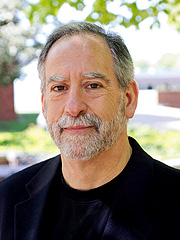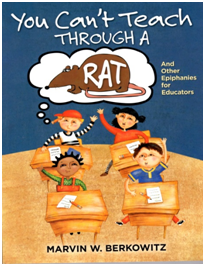CMSE will sponsor a workshop by Professor Berkowitz.
 CMSE will have a workshop by Professor B as follows.
CMSE will have a workshop by Professor B as follows.
REITAKU UNIVSTITY CMSE CENTER FOR MORALSCINE AND EDUCATION Sponsors Workshop A Pedagogy of Empowerment time:August 20th(Tuesday)1:00-4:00 p.m. place: Reitaku University Room 2508 Participation Fee:3,000 Yen
Marvin W. Berkowitz, PhD. Dr. Berkowitz is the inaugural Sanford N. McDonnell Endowed Professor of Character Education at the University of Missouri-St. Louis. His research interests are character education, moral development, adolescent development, and risk-taking. He is the author of You can’t Teach Through a Rat (2012), Parenting for Good (2005) and more than 10 book chapters, monographs, and journal articles, and editor of Moral Education: Theory and Application (1985) and Peer Conflict and Psychological Growth (1985). He has served as a board member of the Character Education Partnership and the Center for Social and Emotional Education, and as the co-editor of the Journal for Research in Character Education.
 Agenda of Workshop Berkowitz (2009; Berkowitz & Bier, in press) has identified five core principles of effective character education: Prioritization; Relationships; Intrinsic Motivation; Modeling; Empowerment. The last of these has also been labeled a “pedagogy of empowerment.” This workshop will briefly introduce the five-part model (PRIME), and focus on the pedagogy of empowerment. Schools in most societies tend to be hierarchical and authoritarian in nature, a form of “benevolent dictatorship” with educators fully in charge but disposed to serve the best interests of children, and children largely disempowered but feely safe and well-served. (Of course, some educators and schools are not child-focused or even child-friendly, but this presentation will focus on the well-intended but nonetheless misguided educators who want to serve children but do not understand that a parternalistic/maternalistic and disempowering style does not serve children optimally. One argument to support this comes from the perspective of citizenship education in democratic societies. The philosopher John Dewey (1944) argued clearly that education for democracy had to be education by democracy. In other words, schools have to operate as democracies. A pedagogy of empowerment is optimally applied to all levels of schooling; i.e., administration, adult culture, classrooms. It also includes all stakeholder groups; i.e., adminstrators, teachers, support staff, students, parents, relevant community members. And finally it impacts all spheres of school life; i.e., curricula, after school, discipline, athletics, etc. After making the case for a pedagogy of empowerment, this workshop will examine the ways we tend to fall short in empowering stakeholders. It will give specific examples of both disempowerment and empowerment.
Agenda of Workshop Berkowitz (2009; Berkowitz & Bier, in press) has identified five core principles of effective character education: Prioritization; Relationships; Intrinsic Motivation; Modeling; Empowerment. The last of these has also been labeled a “pedagogy of empowerment.” This workshop will briefly introduce the five-part model (PRIME), and focus on the pedagogy of empowerment. Schools in most societies tend to be hierarchical and authoritarian in nature, a form of “benevolent dictatorship” with educators fully in charge but disposed to serve the best interests of children, and children largely disempowered but feely safe and well-served. (Of course, some educators and schools are not child-focused or even child-friendly, but this presentation will focus on the well-intended but nonetheless misguided educators who want to serve children but do not understand that a parternalistic/maternalistic and disempowering style does not serve children optimally. One argument to support this comes from the perspective of citizenship education in democratic societies. The philosopher John Dewey (1944) argued clearly that education for democracy had to be education by democracy. In other words, schools have to operate as democracies. A pedagogy of empowerment is optimally applied to all levels of schooling; i.e., administration, adult culture, classrooms. It also includes all stakeholder groups; i.e., adminstrators, teachers, support staff, students, parents, relevant community members. And finally it impacts all spheres of school life; i.e., curricula, after school, discipline, athletics, etc. After making the case for a pedagogy of empowerment, this workshop will examine the ways we tend to fall short in empowering stakeholders. It will give specific examples of both disempowerment and empowerment.



